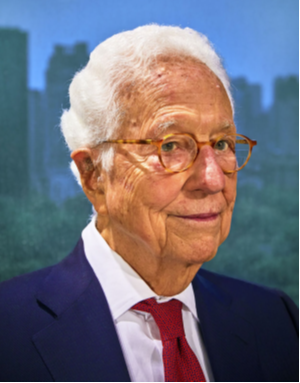THE
WALL STREET JOURNAL.
|
Business
The Boardroom Sage Who Was Into
Good Governance Before It Was Cool
Ira Millstein has long argued that America’s biggest companies
have larger obligations to society. Now the rest of the business
world is coming around to his view.
|
 |
|
JEFF
BROWN FOR THE WALL STREET JOURNAL |
By
Corinne Ramey
Nov.
15, 2019 5:30 am ET
Corporate-governance guru Ira Millstein has long argued that corporations have
larger obligations to society that go beyond profits. Now some of America’s most
influential CEOs are giving this opinion a fresh look.
Consider the philosophical shift under way at the Business Roundtable, a
corporate lobbying outfit that counts among its members the chief executives of
dozens of the biggest U.S. companies.
For
more than two decades the Business Roundtable defined a paramount duty of a
company as the accumulation of shareholder wealth, a view popularized by
economist Milton Friedman. That era officially ended in August when CEOs backed
a new statement that delineated a company’s purpose more broadly. Corporate
leaders, it said, should serve “all of our stakeholders”—from employees and
communities to customers and suppliers.
The
change in posture—which follows a larger debate about the role of capitalism now
roiling politics around the world—returns the Business Roundtable to a doctrine
it last embraced in the early 1980s with assistance from Mr. Millstein, an
attorney who served some of America’s largest companies. It was Mr. Millstein
who helped the group write a 1981 “Statement on Corporate Responsibility” that
argued “the long-term viability of the business sector is linked to its
responsibility to the society of which it is a part.” That idea lasted until
1997.
Now
93 years old, Mr. Millstein is the founding chair of Columbia Law School’s Ira
M. Millstein Center for Global Markets and Corporate Ownership, which seeks to
influence how corporations adapt to changing pressures of society, and a senior
partner at law firm Weil, Gotshal & Manges LLP. In the late 1990s, he also
represented a member of the family that controlled a majority of the shareholder
votes of Dow Jones & Co., the publisher of The Wall Street Journal.
In
an interview with The Wall Street Journal he discussed the new Business
Roundtable statement, whether regulation could make businesses behave better and
why he loves the author Malcolm Gladwell. Here are edited excerpts from the
conversation:
WSJ: What do you think
of the new statement?
Mr.
Millstein: It’s a good first step, but it needs a lot of work. I want to see it
spelled out. At the moment, it’s sort of wishful thinking, not meat and
potatoes.
WSJ: How does it
become meat and potatoes?
Mr.
Millstein: In 1979, the Business Roundtable conducted a series of hearings and
concluded that boards of directors had to be much more interested in corporate
governance. Corporations had to be managed and directed by the board. They also
said one of the things the board has to do is pay attention to its constituents,
including the community and labor. In 1981, they issued a new statement, and I
helped them draft it, because I was young and vigorous at the time.
It
undoubtedly has what I would like them to include now. In 1981, they said, not
only do we believe in corporate responsibility, but we have to do something
about it. They had policies: the right personnel, adequate structure, what
changes should be made in staffing and attitude.
I
think [the current Business Roundtable] should have gone back and taken a look
at the ‘81 statement and said, ‘Look, we knew all this in 1981 and we didn’t do
anything about it. We laid out our own map and didn’t follow it.’

Ira Millstein, here working from his office in
New York, said a new corporate purpose statement from the Business
Roundtable is a ‘good first step, but it needs a lot of work. I want to
see it spelled out. At the moment, it’s sort of wishful thinking, not meat
and potatoes.’ PHOTO: JEFF BROWN FOR THE WALL STREET JOURNAL |
WSJ: What happened
between 1981 and 2019?
Mr.
Millstein: Shareholder primacy became the mantra. Management and boards began to
think the only way to get ahead in the world was to pay attention to this
shareholder-primacy doctrine. There was tremendous pressure from boards and
management to make a profit.
WSJ: Are these ideas
cyclical? Should we expect a return to prioritizing shareholders?
Mr.
Millstein: I don’t want this to disappear like the 1981 statement. But now we
have more people pressing for change—labor, the community, religious groups.
To
quote Malcolm Gladwell, I think we’re reaching a tipping point. I love Malcolm
Gladwell—he’s provocative and makes you think. I like the tipping-point term
because it represents a point where enough people begin to talk about something
that it becomes reality.
WSJ: Can’t we just
make laws to force companies to prioritize more than making money?
Mr.
Millstein: I don’t think you can regulate doing the right thing.
Legislation would come if you listen to Elizabeth Warren. But I’m a realist. I
don’t think the tax situation can be changed in any way other than a new law.
Other than that, when it comes to treating your employees better, when it comes
to looking at your risks, legislation doesn’t make you a good guy.
I
believe the directors are the people who can make it happen. They started
thinking about it in ‘81. Now they can do something about that.
Write to Corinne
Ramey at Corinne.Ramey@wsj.com

